

  |
|
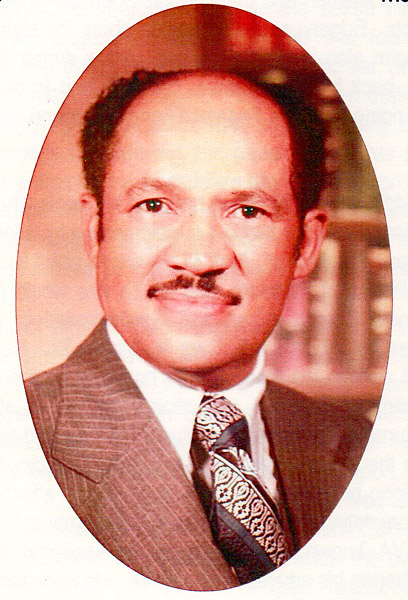
|
Name: Eugene Charles Allen Date: ca. 1970 Image Number: CEA01cdCE01 Comments: &nbs Charles Allen was born on July 14, 1919, in Buckingham County, VA, to the late Kate Allen Tapscott. Eugene was raised by his aunt and uncle, Susie and Charlie Brown, on Shirland Farm near Scottsville, VA. Eugene attended the Glendower School in Albemarle County, VA, from 1927-1934 where he received high marks under the teachings of Ms. Eva W. Randolph and Ms. Mary D. Barnett. Glendower School was open from 1869-1951. It was the earliest African-American school in the Esmont, VA, community.
Built in 1869, just four years after the emancipation of slavery in America, the first Glendower School building was located at
Gordon Merrick's Glendower Estate at 7369 Dyers Mill Lane in Scottsville. The original Glendower School building was
erected during reconstruction by the Freedman's Bureau on property donated by Mrs. Merrick. In the 1930's, Albemarle County
moved this school from Glendower estate, and
students temporarily attended classes at Mt. Pleasant Baptist Church until a new one-room
school was built about 5 miles away in Keene, VA. Seven classes occupied this one-room school, one teacher taught all the classes,
and after the move, the school kept the Glendower name. Following are a list of the Glendower teachers, who taught Charles Allen in
1927-1934 when he attended Glendower School in Scottsville District, Albemarle County, VA: In 1941, Eugene took a job at the Kenwood Country Club in Bethesda, MD. He met and married his beautiful wife, Helene Lee of Conway, NC in 1943, and their only child, Charles, was born in 1946. In 1951, Eugene went to the White House to interview for a vacant Pantryman position, and soon advanced the ranks from Pantryman to Butler and then to his final position as Maitre D' of the White House under President Ronald Reagan. In his 34-year White House career, Eugene served 8 presidents and their families before retiring in 1986. Eugene and Helen Allen were married for 65 wonderful years before Helene passed away on November 3, 2008, on the eve of the 2008 historic election of Barack Obama as U.S. President. Before the election, Helene marveled at the idea of a black man in the Oval Office. "We're pretty much past the going-out stage," said Helene. "But you never know. If Obama gets in there, it'd sure be nice to go over there again." Helene, who had planned to vote for Obama on Nov. 4, died the day before the election on Nov. 3, 2008. The next day, Eugene walked to his voting poll to cast his vote for Obama. With Obama's success at winning the Presidency, Eugene received a VIP invitation to Obama's swearing-in where a Marine guard escorted him to his seat. Eyes watering, Eugene watched the first black man take the oath of office of the presidency. Eugene Charles Allen passed away on 31 March 2010 in Takoma Park, MD, and is buried at Rock Creek Cemetery in Washington, DC. Following is a tribute booklet put together for Eugene's funeral by his family and friends: A Life Well Lived: Eugene Charles Allen
What can you say about a great and good man who is gone? Eugene Charles Allen was born on July 14, 1919, in Buckingham County, VA, to the late Kate Allen Tapscott. Eugene was raised by his aunt and uncle, Susie and Charlie Brown, on Shirland Farm in Albemarle county, VA (near the town of Scottsville) along with his brother, Geater, and first cousins, Emma and Albert Allen. Eugene was also greatly influenced by his maternal uncle, John Robert Allen, who he described as a raconteur (he didn't use that word), master craftsman and unrecognized genius -- a man capable of building a house from scratch without blueprints. Eugene spoke with pride about the sight of Uncle John "supervising" a construction crew. Uncle John also worked as a hod carrier during the construction of the Federal Triangle in Washington, DC, back in the day when concrete had to be carried on the shoulder, up a ladder, many stories. When riding past the Federal Triangle, Eugene often remarked, "Uncle John built that." Eugene later adopted the middle name, Charles, in honor of his uncle Charlie, also naming his only child after him. The family subsistence was meager but supplemented by a lot of love and affection. Eugene once related that as dinnertime approached, Aunt Susie would point to a chicken in the yard, dispatch the to the wood pile to relieve it of its head, after which she would prepare a meal for six people. Shirland Farm on which Uncle Charlie, Albert, and Geater toiled in the fields, was owned by the benevolent Moon Family, headed by patriarch Cary N. Moon, Sr. Eugene, a jack-of-all-trades, and Emma, a skilled cook, would work in the Moon family home under the direction of matriarch, Florence Moon. This was the beginning of Eugene's education in the art of attending to a house and more importantly as it would later turnout, the formalized, ritual of setting and serving the table. Along with his cousins, Eugene played with the Moon's only son, Cary (later Dr. Cary N. Moon, Jr.), who was roughly his age. They formed a lifelong bond that was built on trust and affection that lasted until Dr. Moon's death in April 1997. After completing the 11th grade in the county school system, Eugene traveled to the resort in Homestead, VA, known as Hotsprings for seasonal employment as a waiter and, unbeknownst to him, the furthering of his education in service. He once remarked on seeing the Maitre D' at Homestead tipped $10.00 and wondering in awe, "How does one get into a position like that?" Eugene greatly valued the Homestead experience, especially the friendships formed with the many other young Blacks (or Colored as we were known in those days) employed there. During the off season, Eugene was approached by Mr. Moon's brother-in-law, Dr. Shannon Butts, a prominent dentist in Washington, DC, who suggested that he come to work for him until the beginning of the next season at Homestead. Eugene took him up on the offer, little knowing that Washington would become his permanent home, and the next chapter of his life was about to begin. Eugene possessed a very nurturing personality; one of his duties with the Butts Family was the care of their young son. On one occasion, he accompanied the young man to Glen Echo amusement park with his mother, who was afraid of some of the rides. When she asked an attendant if Eugene could accompany the child on the ride, she was unceremoniously told by an attendant, "That won't be possible." When Dr. Moon, then a track star at the University of Virginia came to the University of Maryland to participate in a meet, Eugene attempted to attend the meet but was escorted to a part of the stadium where he couldn't even see the track. Eugene's favorite task for Dr. Butts was captaining and maintaining his cabin cruiser which was located in Deal, MD. This was marred somewhat when he once heard the local sheriff tell Dr. Butts, "You make sure you get that boy out of town before dark. We don't want his kind down here." That not withstanding and in spite of a chronic seasickness condition, Eugene always maintained a love of the water and pleasure craft. Before Eugene's departure from the Butts Family, Dr. Butts gave him his first car, a new Plymouth. In the end, it was more of a familial relationship than a job." Sometime in 1941, Eugene was approached by childhood friend, John Wayne (aka "Bozo"), who was a waiter at the Kenwood Country Club in Bethesda, MD, and asked him if he was interested in an available position at Kenwood. Eugene accepted the offer and found him ensconced as the manager of the golf clubhouse. His duties consisted of tending the bar, maintaining the locker room and cleaning the equipment of club members. Eugene once remarked that he really made his money at Kenwood off of tips, further relaying that $1.00 in 1941 was the going rate for cleaning a pair of golf shoes. Eugene also made money by caddying and developed a true passion for the game that he learned and further developed while playing on caddie's day which fell on Mondays. Eugene stated that sometimes there would be a large turnout of Kenwood Club members who would come to watch them compete. It was also during this period that Eugene forged lifelong friendships with Gerald Hatton and the late Luther Mcdowell, bonds formed as strong as those between brothers. Eugene's life was to take its most significant and dramatic turn when in 1943, he was introduced to the spectacularly beautiful, Helene Lee of
Conway, NC, by his childhood friend, Gary Coldtrain. Lifelong friend, Mary Lord, once related that, "Eugene was so protective of Helene that
he wouldn't let her do anything, " and she indeed spent her life with Eugene in the safe environment of the home as a housewife. Following a
whirlwind courtship, Eugene and Helene were married at the now defunct Elks Home on 4th Street and Rhode Island Avenue in Northwest Washington, D.C., on
November 4, 1943. Of that union was born their only child, a son, Charles, in 1946. Two weeks following the birth of Charles, they moved
into their permanent home located in northwest Washington where they resided the rest of their lives. It should be noted that this was accomplished
when the owners of the property broke a covenant barring the sale of said property to Colored people. On November 26, 1949, Eugene was
raised to the sublime degree of Master Mason with Ionic Lodge #17, Free and Accepted Masons, Prince Hall Affiliation of the District of Columbia, Incorporated, of which
he was a loyal and faithful member of 59 years. That same year, Eugene joined the Greater First Baptist church then located at Sherman Avenue
and Larmont Street in Northwest Washington and pastored by the good shepherd, Rev. Edward Thomas. Eugene served faithfully on the Usher Board,
the Trustee board, and the July Birthday Guild during the course of his life at Greater First Baptist. 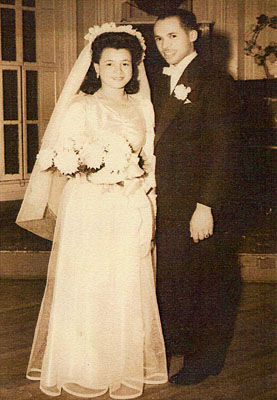 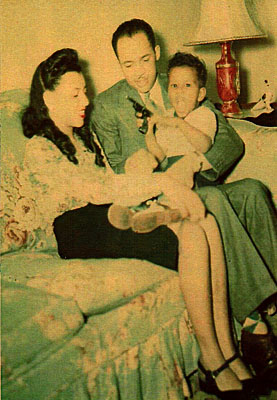 Photo Left: Helene and Eugene Allen, 4 Nov. 1943; Photo Right: Helene and Eugene Allen with their son, Charles
In 1951, at the suggestion of another Kenwood co-worker whose name is now lost to history, Eugene went to the White House to interview for a vacant Pantryman position. He was interviewed by then Maitre D' Alonso fields, an imposing figure and man to be reckoned with who informed him that I think you'll do." During his background investigation by the FBI, it is rumored that Mr. Moon, Sr. remarked, "Lord, what kind of trouble has that boy got himself into in Washington?" Eugene advanced through the ranks from Pantryman, Butler, 2nd Butler, and 1st Butler to his final position as Maitre D'. A couple of years after his arrival on the job, he was able to secure a position for his brother-in-law through marriage and brother figure, Johnny Johnson with whom he shared a career of over 30 years,both retiring the same day in 1986. Wilson Jerman secured the position of Maitre D' upon Eugene's recommendation following his retirement. Jerman had years earlier been elevated to the butler position from the household staff by him. Eugene was also a charter member of the White House golf team of which he was a three-time champion. During the course of his career, he also worked with the likes of good friend, Benjamin Harrison (Houseman), Charles and John Ficklin (retired Maitre D's), Sam Flicklin, Fate Suber, Robert Thompson, Armstead Barnett, William Bowen, Robert Harmon, Alex and herman Thompson, Alfredo Saenz (retired Maitre D's), James Ramsey, Lynwood Westry, Preston Bruce (Doorman), Fred Oliver, and many, many other noble practioners of service too numerous to mention. During and after his career, Eugene was asked many times to name his favorite President among other things. His pat answer was, "I liked them all." In truth, he truly did but in as much as the writer is not bound by "The White House Code of Silence", I'll explain that in a little more detail. He considered Harry Truman to be the everyman President, straight talker, straight shooter, who inherited some big shoes and filled them. Eugene further described Truman as hands down, the best dressed President followed by John Kennedy. He greatly admired Dwight Eisenhower's military bearing, intelligence, and for having the foresight to foresee the necessity of building the interstate highway system. He considered Eisenhower's act of sending the 101st Airborne Division to Little Rock, AR, during the desegregation crisis an especially admirable act on Eisenhower's part, calling it an example of a man acting responsibly and doing his job in a not altogether popular cause at that time. Eugene stated that John Kennedy was a man possessed of great beauty, peerless charisma and aplomb, who unfortunately didn't live enough to see some of the things he put in motion come to fruition. In spite of prevailing options, Eugene liked Richard Nixon, calling him an easy man to work for. He was much grieved by Nixon's demise and ultimate resignation. When pressed about his sentiments surrounding the 1960 Presidential election, Eugene would demur but would eventually say that they, i.e., the White House Staff, knew they could work with Nixon, having spent eight years with him during the Eisenhower Administration. Eugene further stated that the only thing they heard about Kennedy at the time was that his father had a lot of money. Many years later, Eugene remarked, "Just think, we would have never known those wonderful people (the Kennedy's)." Once during a conversation with the writer, Eugene once stated that given all of life's gifts bestowed upon them, he could never envision another young couple of the Kennedy example ever entering the White House again; he shook his head and said it would never happen. Eugene considered Lyndon Johnson, the greatest, underrated President in history, a very tough man and a very adept at wielding of power; a man well prepared for the job that could get things done. He said that years from now, Johnson's civil rights would be the jewel in his crown. Eugene shared the same birthday and a passion of golf with Gerald Ford, a common bond that lasted for many years. Ford often called him from the golf links on July the 14th to wish him a happy birthday. Eugene liked Ford's common man touch, remarking how after a morning swim, he would come into the pantry, sit down, eat an English muffin and talk shop. Eugene failed to see the pratfall, humor in the Saturday Night Live impersonations of Ford, calling him the best athlete in the White House in his time. Eugene felt that like JFK, Ford had much more to offer the country but just didn't get enough time. Eugene felt that Ronald Reagan's charisma and professional training and bearing made him a force to be reckoned with as Commander in Chief, often commenting on the remarkable carriage he had for a man his age. When asked whether Reagan dyed his hair, he would always say, "I never saw him do it." Eugene expressed the opinion that all of these gentlemen were special people, stating, "You don't ascend to that position unless you and your wife are cut from a very special piece of cloth." In the last year of his life, Eugene admitted that another young couple had indeed entered the White House who possessed the Kennedy magic. Eugene and Helene spent 65 wonderful years together, living together in apparently perfect symbiosis. They enjoyed entertaining family on holidays, in the early days watching the Friday night fights on a television about as big as an alarm clock ("Oh, the wonder of Joe Louis and Sugar Ray Robinson!") with what seemed the whole neighborhood, Friday night Tonk and poker games of the friendly/neighborly type, Sunday journey's to Southern Maryland for barbecue ribs, traveling to Atlantic City with Johnny and Doris Johnson to play the slots, consuming Ben's Chili Bowl HOT half smokes and watching the Redskins win or lose. When the infirmities of old age overtook them, they would sit for hours on end watching the Games Show Network. Eugene probably more than anything enjoyed beating up on his good friends, Gerald Hatton, Benjamin Harrison, and Luther McDowell, on the golf links; despite his innate goodness, he was human enough to enjoy the thrill of victory. As you can imagine, Eugene was a perfect father, never being able to muster enough violence to administer a proper beating which was always well deserved. Any form of violence was just not a part of his nature. He came from an era when fathers really weren't buddies but he was a great buddy and indeed a hero in spite of the fact that he once tricked Charles into eating calf brains by telling him, Queen Elizabeth loved them. Eugene was not a man of many words, but here are some of the pearls of wisdom that Eugene imported to his son: "Don't break bad unless you have something to break bad with;" "If you are lucky enough to have a job, hold on to it for dear life and do the very best at it that you can, and somebody will recognize you." Eugene's life and legacy are a testimony to that last observation. When Helene departed this mortal coil on November 3, 2008, a large part of Eugene went with her. They were not in any way demonstrative people but theirs was a deep and abiding love, a partnership maybe equaled but never surpassed. James 4:6 in the New Testament states that God is opposed to the proud but give grace to the humble--Eugene Charles Allen was graced. In addition to Helene and his mother, Eugene is predeceased by his brother, Geater, and beloved sister-like, first cousin, Emma Allen Hill. He is survived by son, Charles Eugene Allen' daughter-in-law, Ortaciana Brooks Allen; grandchildren, Charles E., Jr., Dionne M., and Che T. Allen; step grandchildren Kimel R. Dixon and Enrique "Deuce" Williams, Ejai Jerome Barnes, and Micah Eugene Dixon. There is simply not enough paper to list all of the many other family members and friends. 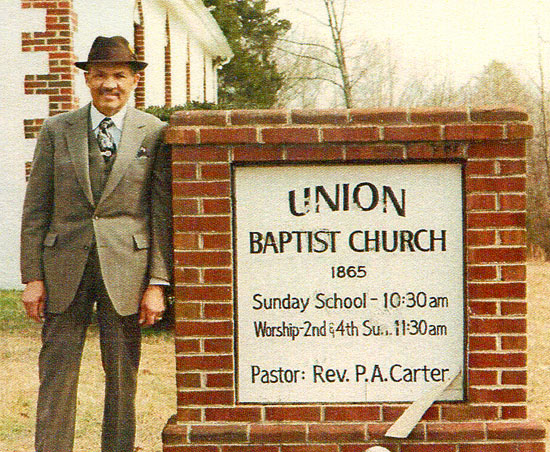 Eugene Allen at Union Baptist Church, Scottsville, VA 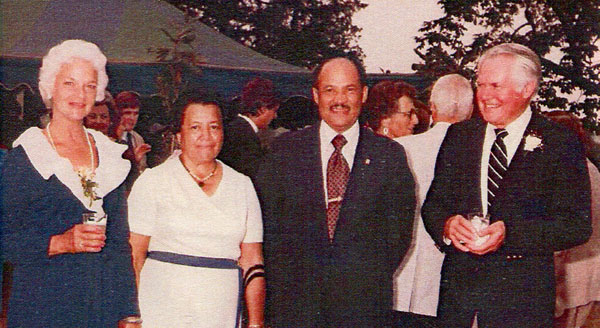 Eugene and Helene Allen with friends, Mary and Cary Moon
To read the Washington Post obituary for Eugene Allen, dated 2 April 2010, visit 'Humble Butler' Served Eight American Presidents. To learn more about Eugene Charles Allen, visit The Smithsonian Institute's web site at: Hear From the Real Butler of the White House, Eugene Allen
The photos above are contained in the tribute booklet prepared for Eugene Allen's funeral in 2010. Copyright © 2018 by Scottsville Museum |
|
|
|
Museum
Archive
Business
Cemeteries
Church
Events
Floods
For Kids
Homes
Portraits
Postcards
School
Transportation
Civil War WWII Esmont Search Policy |
||||
|
Scottsville Museum · 290 Main Street · Scottsville, Virginia 24590 · 434-286-2247 www.avenue.org/smuseum · info@scottsvillemuseum.com Copyright © 2018 by Scottsville Museum |
||||